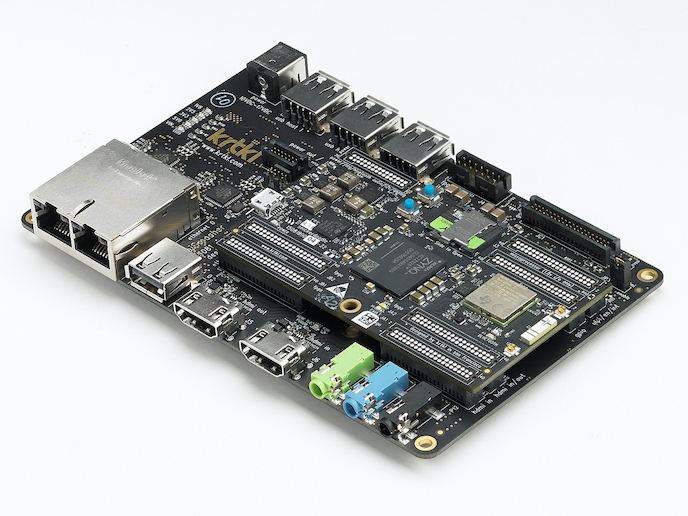Industrial automation offers greater quality control, flexibility and safety for manufacturing. snickerdoodle is a customisable, affordable, palm-sized device that minimises the time, effort and cost of setting up industrial robotics.
Older manufacturing systems lack the benefits of new digital sensing and connectivity technologies (robotics and Internet of Things). But upgrading infrastructure necessitates building hardware-software platforms and customising for performance, power and component integration requirements. This involves significant capital and personnel investments, planned well in advance. These investments need to be weighed against the risks of manufacturing downtime, avoidable equipment damage and process inefficiencies. Under the snickerdoodle project, krtkl (pronounced ‘critical’) created the first, full-stack development board for robotic systems. This houses a central ‘brain’ for various manufacturing component and subsystem connectivity, integration, control and monitoring operations. As the underlying hardware is software reconfigurable, snickerdoodle simplifies the challenge of enabling interfaces for a wide array of sensors, actuators and communication protocols. This offers operators easy-to-understand information and control options. EU SME Instrument funding enabled the project to complete a feasibility assessment and a go-to-market strategy and establish a manufacturing supply chain.
Simplified implementation and development time
snickerdoodle is comprised of multiple processors, software which can be customised by end users who can program the built-in FPGA and wireless connectivity. All this is contained in a device the size of a business card. The main processor runs general purpose and/or real-time operating systems to take care of higher-level tasks, such as machine-to-machine networking or motor control loops. The programmable logic, or FPGA (the ‘brain’), allows both customisation of a system’s inputs and outputs, ranging from interfacing with motors and sensors to becoming a pure video-processing machine. This can be useful in production line monitoring, or computer vision, for example. The FPGA also runs complex control and data-processing algorithms. The system has built-in Wi-Fi and Bluetooth to make integration with modern networks more straightforward. “After years of working in mechatronics and embedded systems, developing one-off solutions for companies to bring new automation products to market, it became obvious that what was needed was a central ‘brain’. This needed to be quickly and easily adaptable to meet the requirements of each specific application,” explains project coordinator Ryan Cousins.
From factories to footwear
After extensive thermal, environmental and endurance testing (on site and in emissions labs), and design simulations (using engineering software), krtkl has developed industrial-grade versions of the technology, available on demand. The commercial version of snickerdoodle and other parts of the development platform (piSmasher and breakyBreaky) are currently available on Mouser for worldwide, same-day shipment. The hardware will also be made available on Amazon later this year. Current commercial uses include real-time motor control and path planning for industrial robotics (six-axis robotic arm for furniture assembly, painting and inspection); low-power/high-endurance remote sensing (oil/gas/utilities), and data collection and processing for preventative maintenance (factory automation). Additionally, the whole snickerdoodle system (including breakyBreaky, piSmasher, enclosures, accessories, etc.) has been used in commercial- and consumer-grade products that have obtained formal FCC certification.
“We’ve seen snickerdoodle used in everything from industrial automation to smart retail and e-sports accessories. We launched with almost no outside capital – something very few people believed was possible. We foresee it touching the lives of many people – even if they never know it exists,” says Cousins.
The team is working on upgrading the device to make it compatible with the latest silicon technologies. This will accommodate cutting-edge applications, such as higher-resolution video processing, artificial intelligence and machine learning, and other computationally intensive uses.
source: cordis.europa.eu

